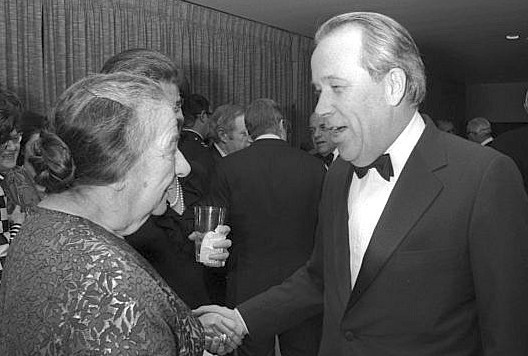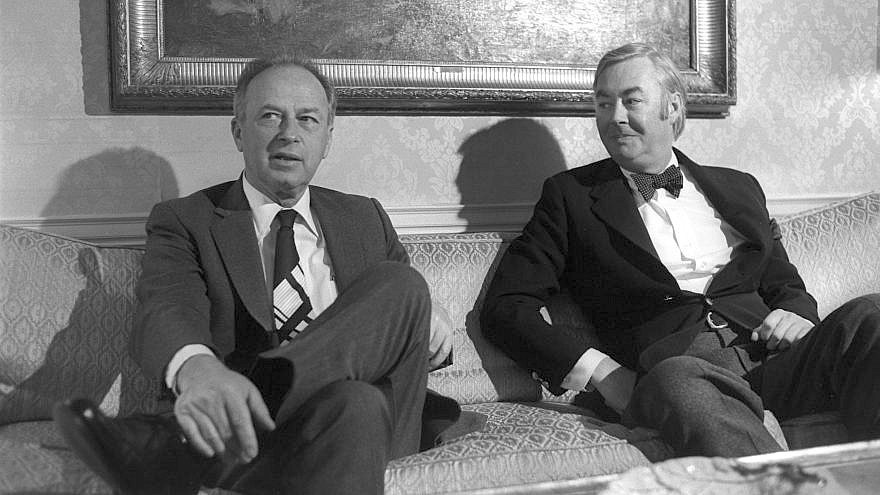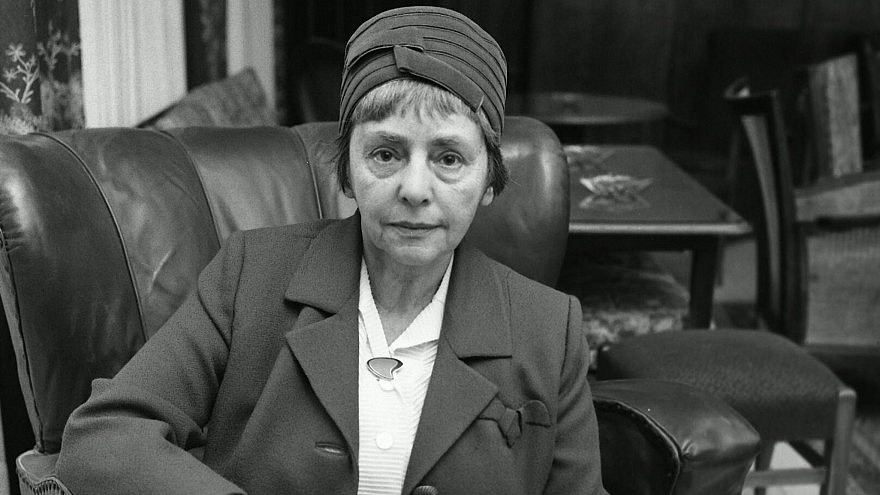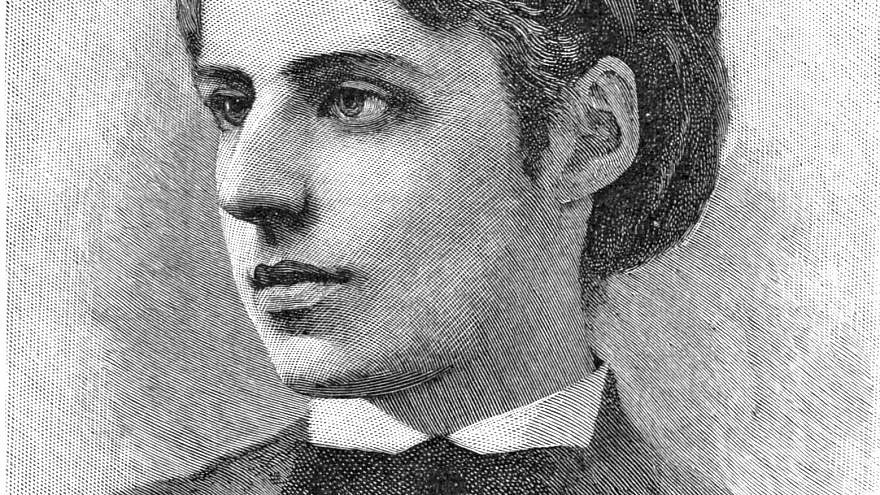Israel salutes America: 70 who counted in 70
On the occasion of the Jewish state’s 70th anniversary, the Israeli embassy in Washington, in partnership with the Jewish News Syndicate, celebrates 70 of the greatest American contributors to the U.S.-Israel relationship
Many of the people and organizations chosen for this acknowledgement will be readily recognized by readers of The Jewish Star, others less so, but their powerful stories build a collective history that reflects the broad base of American love and support for the Jewish state.
This week, The Jewish Star pubishes the second part of a series that will cover all of the “70 who counted.”
Link here to all 9 installments:
Daniel Patrick Moynihan (1927-2003) 11 of 70
After U.N. Ambassador Daniel Patrick Moynihan gave his 1975 speech at the U.N., denouncing its “Zionism Equals Racism” resolution, the British ambassador, Ivor Richard, mocked him by saying that he was playing a cowboy in a Western. The PLO’s observer, Zehdi Terzi, threatened to kill him. Later, when Moynihan was running for election to the Senate, he received a $1,000 check from a woman who said she would have doubled it had he not made such a ruckus about the resolution. Moynihan sent the check back.
Moynihan had never been to Israel but, as he noted, the resolution, “reeked of the totalitarian mind, stank of the totalitarian state.” His outrage reflected his sense of common decency. It would take 15 years to remove the stain, but in 1991, the resolution was reversed. And while this was the noble work of many men, it might not have happened save for the one.
Of course, Moynihan had been involved in other important fights. With regard to Soviet Jewry, whenever possible he met directly with leaders to discuss the cause, not passing the work off to aides. He may also have played the greatest role in establishing the idea that the United States should recognize Jerusalem as Israel’s capital.
“You are entitled to your opinion. But you are not entitled to your own facts,” he famously stated. As the run of recent books, articles, speeches and tweets about Moynihan suggest, his consistent defense of Israel will continue to inspire leaders in the years ahead.
Robert F. Maguire Jr. (1911-2005) 12 of 70
There aren’t a lot of good reasons to risk your life day after day. But Robert F. Maguire Jr., the man who led Operation Magic Carpet, was inspired by one: the songs he heard sung by Yemeni Jews fleeing for their lives.
Referred to as the “Irish Moses” by former Israeli Prime Minister David Ben-Gurion, Maguire was the chief pilot and the organizer of the principal air transport company that brought 40,000 to 50,000 endangered Yemeni Jews to safety in Israel. “I was lucky, I was blessed that G-d had given me the opportunity,” he said.
The Episcopalian son of a judge who served in the Nuremberg trials, Maguire was a World War II combat pilot in the Pacific. In 1947, he was flying for Alaska Airlines. Under its direction, he brought Jews to Palestine from Shanghai.
Then pogroms against the Yemenite Jews started, and by December 1948, the airline was under contract to ferry them to Israel. The operation was secret, and the planes had to fly low to avoid Arab guns.
The missions began in Eritrea. Then they went to Aden, where they picked up huddled masses of Jews carrying Torah scrolls and their few belongings. From there they ran to Tel Aviv, then to Cyprus, and finally back to Eritrea. The round-trip flights ran for as much as 20 hours.
When Alaska Airlines was compelled to exit, Maguire put together his own firm, Near East Transport, with 28 pilots, to continue the flights. In more than 380 separate journeys, not one Jew or pilot was killed.
Later, Maguire led Operation Ali Baba, which rescued still more Jews from Iraq and Iran.
One of Maguire’s most dangerous missions required him to land a plane short on fuel in Egypt. He had been warned that if the passengers’ Jewish identity were to be revealed, all on board might be killed. Thinking quickly, he told the Egyptians that he needed fuel for a plane full of small-pox victims. The plane was refueled and not searched, and he landed it safely in Israel.
Henry M. ‘Scoop’ Jackson (1912-1983) 13 of 70
It is a mark of Scoop Jackson’s brilliant career that his very name still connotes a political orientation. If one identifies as a “Scoop Jackson” Democrat or Republican, one is in favor of a robust America that defends its ideas and interests in the world—principally, and above all, the cause of political liberty. As he saw it, the defense of Israel was part and parcel of the defense of liberty and of America.
Jackson, who accompanied American troops at the liberation of Buchenwald, was an ardent Zionist, advocating the creation of a Jewish homeland, then tirelessly defending it. He wrote the 1974 amendment named after him: Jackson-Vanik, which blocked trade benefits to countries that denied their people the right to emigrate. The amendment was intended to pressure the Soviet Union to allow Soviet Jews to emigrate to Israel. As Israeli Prime Minister Yitzhak Rabin wrote, “this could not have been possible but for your personal leadership.”
Less well-known was another Jackson amendment in 1970, authorizing President Nixon to sell Israel F-4 Phantom II fighter jets on terms that amounted to a grant. These aircraft were essential to Israel throughout the 1970s, when the Soviet Union was supplying advanced aircraft and missiles to its enemies.
When Arab armies attacked Israel in the Yom Kippur War of 1973, Jackson mobilized fellow Congressional leaders to demand the urgent resupply of weapons to Israel. From the Arab invasion to Israel’s victory, Jackson worked around the clock to ensure that Israeli forces would have the material, diplomatic and political support necessary for victory. When the Nixon administration balked at direct and visible material support, Jackson worked with Secretary of Defense James Schlesinger, Director of the State Department’s Bureau of Politico-Military Affairs Seymour Weiss, and senior American military commanders, especially Chief of Naval Operations Elmo Zumwalt, to secure the decision to airlift vital weapons and ammunition to a gravely imperiled IDF. Without Jackson’s intervention, the weapons, which enabled Israel to turn the tide, might well have arrived too late.
In 1976, a New York magazine article referred to the Presbyterian Senator as the “Jewish candidate” for President. The article quoted the Saudi ambassador in Washington: “Who is this Henry Jackson—from 6,000 miles away from Israel, more Jewish than the Jews, more Zionist than the Zionists?” For 30 years, Israel was blessed to have had this giant in the Senate so firmly on its side.
Charles Krauthammer 14 of 70
The Pulitzer Prize winning columnist, Charles Krauthammer, is one of the most influential writers in America. While the arc of his political sympathies has taken him from “writing speeches for Walter Mondale to Fox News,” his defense of Israel has been an unwavering constant.
Born into a Jewish-Francophone home in New York City, Krauthammer was raised in Montreal. While a student at McGill University, he was editor of the McGill Daily, upholding a sober liberal political position in opposition to the radicalism of the late 1960’s. Graduating from Harvard Medical School, he embarked on a career in psychiatry but turned to political writing because of his deep reading of Jewish and world history and a conviction that the good things in life ultimately depend on a decent political order.
The defense of Israel on moral and political grounds has been a dominant concern of Krauthammer’s career. As he told his friend and colleague William Kristol in an interview, support for Israel has been central to him since “the beginning of [his] consciousness.”
As he put it, “Israel is different. … It is the only nation on earth that inhabits the same land, bears the same name, speaks the same language, and worships the same G-d that it did 3,000 years ago. You dig the soil and you find pottery from Davidic times, coins from Bar Kokhba, and 2,000-year-old scrolls written in a script remarkably like the one that today advertises ice cream at the corner candy store.”
Writing that the return of a people to its land after 2,000 years of exile is “a unique event in human history,” Krauthammer has argued eloquently for what might be called “Israeli exceptionalism,” and explained compellingly why America and, indeed, all supporters of democracy owe Israel their support. The Jewish state has certainly been exceptionally blessed that the powerful pen of Charles Krauthammer has come to its defense decade after decade.
Michael Bloomberg 15 of 70
Brilliant businessman, philanthropist and three-term mayor of New York, Michael Bloomberg has been a staunch supporter of Israel throughout his public life—sometimes in its most difficult moments.
The first Israel Day Parade of Mayor Bloomberg’s tenure came in 2002, at the height of the Second Intifada. At the time, Israel was subject to vicious attacks for its alleged “disproportionate” response in defending its citizens from suicide bombings and other attacks. By proudly marching in the parade, Bloomberg made clear where he stood: “Given what’s gone on in the Middle East, it is terribly important that New Yorkers send a message to the world — we are behind Israel, and we are against terrorism, period,” he said.
Similarly, during the 2014 conflict with Hamas in Gaza, the U.S. Federal Aviation Administration suspended all flights into Ben-Gurion Airport due to the risk of rocket fire. Bloomberg publicly flew to Israel and wrote an op-ed piece strongly disagreeing with the FAA’s policy, proclaiming that such a decision would embolden Hamas. Once again, Bloomberg led by example. He not only encouraged Americans to visit Israel, he did so himself.
Bloomberg’s support for Israel has also been felt through his considerable philanthropy, and he has played a major leadership role in the creation of projects that have proved to be a great boon to both America and Israel. He led an effort to create a technology campus on Roosevelt Island in New York as a joint effort between Cornell University and the Technion-Israel Institute of Technology in Haifa, personally contributing $100 million to the project.
In 2014, Bloomberg was honored in Jerusalem as the first recipient of the Genesis Prize.
Emma Lazarus (1849-1887)
16 of 70
Today, Emma Lazarus is best known as the writer of the words engraved on the pedestal of the Statue of Liberty. However, in her tragically short life (she died at the age of 38 in 1887), Lazarus accomplished so much more than penning “The New Colossus.” In addition to being a member of America’s literary elite and receiving praise from the top critics and authors of the day, she fought tirelessly for the welfare of Jewish immigrants and was one of the earliest American public advocates of Zionism.
Lazarus was born in New York City in 1849 to Moses and Esther Nathan. Her family traced their ancestry to the early Sephardic community in America and had become quite prosperous. While other branches of the family were proudly and openly involved in religious Jewish life (her grandfather and uncle both served as parnas of Congregation Shearith Israel, while another uncle was the chazzan), Moses wanted to assimilate into elite American.
Lazarus began to write from an early age, receiving accolades from famous authors of the day, such as Ralph Waldo Emerson, who became her friend and mentor.
Although she received virtually no Jewish education, early in her career she showed interest in the theme of Jewish national revival. One clear example is her poem “In the Jewish Synagogue at Newport,” a reference to Henry Wadsworth Longfellow’s “The Jewish Cemetery at Newport.” While Longfellow declared that “dead nations never rise again,” Lazarus concluded “the sacred shrine is holy yet.”
With the explosion of European anti-Semitism leading to a massive influx of Jewish immigrants, Lazarus felt a call to action. She responded by personally assisting and organizing institutions geared toward helping Jewish immigrants.
At the same time, she began to explore her Jewish identity, turning again and again to Jewish figures and subjects in her writings. She also began to call for a return of the Jews to the land of Israel. In her “Epistle to the Hebrews” (1882), she Lazarus urged Eastern European Jews to emigrate to Palestine.
A powerful example of her proto-Zionism (the term was not even coined until 1891) is her poem “The New Ezekiel.” Recasting the prophet’s vision of the dry bones from a modern perspective, Lazarus proclaims that the bones, which have been dried by “twenty scorching centuries of wrong” would yet live, with G-d stating, “and I shall place you living in your own land.”
A visionary ahead of her time, Emma Lazarus is an incredible example of dedication to Jewish peoplehood and the ideal of Jewish national rebirth in the land of Israel.
Haim and Cheryl Saban 17 of 70
Haim Saban’s commitment to the Jewish state is that of an immigrant for whom it was a sanctuary.
Born in 1944 in Alexandria, Egypt, to a seamstress mother and a toy-salesman father, Saban fled with them to Israel in 1956. That led them to a windowless, one-room dwelling in Hatzor HaGlilit near the Golan Heights. Times were hard, and Saban helped support the family by rising at 6 am each day to work as a messenger boy. Barely finishing high school, he had the ambition to be a successful pop musician. After a brief stint as a bass-guitar player while serving in the Israeli Defense Forces, he was drawn into a career as a music producer, and then to TV sales and production.
Saban immigrated to the United States in 1983 where he became a media magnate. The first source of his wealth came after founding Saban Entertainment, when he purchased the lucrative foreign rights to the Japanese children’s show “Mighty Morphin Power Rangers.” After amassing his large fortune in America, Saban never forgot his Jewish roots and throughout his life remained devoted to Israel.
Saban and his American-born wife, Cheryl, give generously to causes from health care and education to women’s empowerment. But perhaps one of the largest beneficiaries of their philanthropy has been Israeli soldiers and veterans and the cause of strengthening the U.S.-Israel relationship.
Becoming involved with politics more than two decades ago, the Sabans have worked tirelessly to bolster support of Israel within the Democratic Party. A testament to that devotion is apparent in Haim Saban’s clear and concise words, when he once said: “I’m a one-issue guy, and my issue is Israel.”
Marie Syrkin (1899-1999) 18 of 70
Marie Syrkin was raised in Zionism as a way of life and as a creed. Her reputation and importance comes from her dogged efforts on behalf of Zionism in America, later in Europe, and finally in Israel.
She wrote speeches for Chaim Weizmann and Golda Meir, whose biography she would later write. She recorded testimony from Holocaust survivors, and exposed the horrors of the Soviet Union. Her dispatches from Palestine before and during the War of Independence described the bravery and hardships of the Jewish resistance, and refuted false claims about the circumstances of the Arab flight during the 1948 war.
Among her outlets was the Jewish Frontier, for which she was a reporter and editor. In its pages, she called for increased Jewish emigration before the war, and in 1942 disclosed news of a cable, originally intended for Stephen Wise, that detailed the “systematic murder” of Jews by the Nazis.
She traveled between Europe and Palestine, publicizing the condition of Jewish displaced persons, agitating for their assistance, and helping many of them to receive Hillel scholarships. She also authored a report, later adapted for the UN, on the militaristic intentions of Arab nationalists, disproving claims that Israel had deliberately damaged mosques. Accepting a professorship at Brandeis in 1950, Syrkin started the new field of literary study of the Holocaust.
A true woman of valor, Syrkin fought for the Jewish people and for Israel throughout her life.
Sheldon and Miriam Adelson 19 of 70
Many successful businesspeople struggle to think of causes to which they might devote their energies. This dilemma has never seemed to afflict Sheldon and Miriam Adelson.
Sheldon, an entrepreneur and casino magnate, and Miriam, a doctor of medical research, have known great success in their respective fields. Determined to put the fruits of their success to work—both in the present and for the future—they have single-mindedly devoted themselves to projects and institutions that benefit the Jewish people and the Jewish state.
It would be impossible to mention all of the Zionist and Israeli causes the Adelsons have supported in their years of activism. Every year, the Adelsons give more than $200 million to causes that directly support Israel and the Jewish people. Major beneficiaries have included Birthright Israel, Yad Vashem and programs that directly benefit Israeli soldiers. Known for their interest in education, the Adelsons have also funded Jewish day schools in America and educational initiatives in Israel.
Medical research and care have been a particular emphasis of Dr. Miriam Adelson; as such, the Adelsons have offered extensive support to medical research and medical facilities in both America and in Israel. In June 2017, it was announced that a new medical school bearing the name of the Adelsons would open at Israel’s Ariel University, a fitting donation to a growing university that reflects the Adelsons’ emphasis on both education and medical science, as well as their Zionism.
In recent years, the Adelsons have also devoted themselves to combating movements and ideas that defame and delegitimize the state of Israel. Noting the regrettable rise of hostility to Israel on North American college campuses, the Adelsons have spearheaded efforts to combat this rancor and support educators who tell the truth about the Jewish state. They have also fought against the anti-Semitic Boycott, Divest and Sanctions (BDS) movement, which under the veneer of standing up for Palestinian rights singles out Israel for economic warfare.
Over the centuries, the Jewish people and the Jewish state have been blessed with great philanthropists, like the Rothschilds and Montefiores, who dedicated themselves to helping their people. Our generation has been blessed with the Adelsons, whose generosity and unflappability have earned them an honored place in the pantheon of Israel’s greatest friends.













